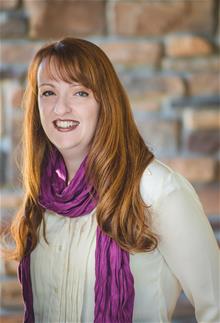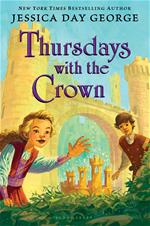 Jessica Day George is a woman of many talents and skills. She speaks three languages—including Old Norse—and traveled to Romania to research her latest book, Silver in the Blood.
Jessica Day George is a woman of many talents and skills. She speaks three languages—including Old Norse—and traveled to Romania to research her latest book, Silver in the Blood.
The author of three series, Castle Glower, Dragon Slippers, and Princesses of Westfalin, she embraces the point where fantasy, science fiction, and fairy tales meet and encourages teachers to use fantasy fiction in the classroom.
You are planning on ending the Castle Glower series in the next two years. How is it going to end? Just kidding. Seriously, do you know how it's going to end?
THE CASTLE EXPLODES.
(I kid!)
I do, in fact, know how I want it to end. I’ve actually known since Thursdays With the Crown where I wanted them to end up. It will wrap up at the end of Saturdays, which I need to start writing sometime, um, this week.
Did your travels in Romania inspire Silver in the Blood or did the thought of Silver in the Blood inspire your trip?
I started writing Silver in the Blood, using some travel guides as “research,” and realized that I knew absolutely nothing about Romania. My husband and I had actually been toying with the idea of going to Iceland for vacation, but I felt that if I didn’t go to Romania and really get a feel for it, I wouldn’t be able to do justice to the story.
When writing series, are some books easier to write than others? If so, why?
 Oh, goodness, YES. Some books I just have an amazing idea for an adventure that these characters need to have, and the book just comes pouring out. Other books are the story that gets them from Adventure A to Adventure B, and that can be very hard to write indeed!
Oh, goodness, YES. Some books I just have an amazing idea for an adventure that these characters need to have, and the book just comes pouring out. Other books are the story that gets them from Adventure A to Adventure B, and that can be very hard to write indeed!
Your books feature strong heroines. What do you think of representation of female characters in fantasy books?
It depends on the book and the author. There’s always going to be good and bad books, good and bad representation of women in books. Unfortunately. What I would love to see more of is what I myself like to think I’m doing in my books: heroines who play to their strengths. Not all of us are strong enough, or have the training, to wield a sword. But we might be able to save the world by using our wits, or a skill that we do have a talent for: knitting, music, running. In the real world, we all have different talents, and I want to see more books that reflect that!
How do you think educators can incorporate the fantasy genre into classrooms?
Fantasy is an excellent way to talk about Joseph Campbell’s “Hero’s Journey” with students, or to introduce mythology or fairy tales. There are a wealth of fantasy and sci-fi books based on fairy tales and Greek or Nordic myths, and it’s interesting to compare them. Fantasy is also important for teen and younger readers because it creates a comfortable distance from everyday life, but still deals with very heavy subjects like death, or difficult moral decisions, which are often easier to read about and discuss when the setting doesn’t hit too close to home.
George will co-present with educators and fellow children’s book authors Sunday, July 19 at the ILA 2015 Conference in St. Louis, MO. Entitled “Transforming Readers by Connecting Them With Modern Fantasy and the Teachers' Choices Project,” about how a book goes from its germinal idea to the finished product to inspire teachers to use the authors' insights to motivate readers and writers. Visit the ILA 2015 Conference website for more information or to register.